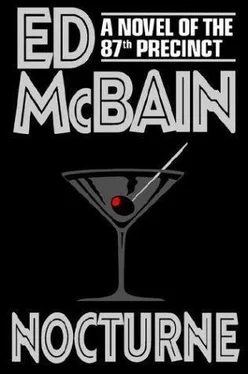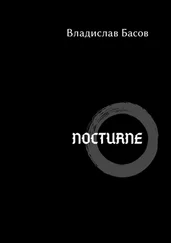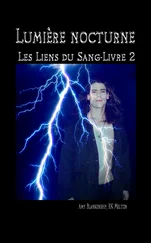Ed Mcbain - Nocturne
Здесь есть возможность читать онлайн «Ed Mcbain - Nocturne» весь текст электронной книги совершенно бесплатно (целиком полную версию без сокращений). В некоторых случаях можно слушать аудио, скачать через торрент в формате fb2 и присутствует краткое содержание. Жанр: Полицейский детектив, на английском языке. Описание произведения, (предисловие) а так же отзывы посетителей доступны на портале библиотеки ЛибКат.
- Название:Nocturne
- Автор:
- Жанр:
- Год:неизвестен
- ISBN:нет данных
- Рейтинг книги:3 / 5. Голосов: 1
-
Избранное:Добавить в избранное
- Отзывы:
-
Ваша оценка:
- 60
- 1
- 2
- 3
- 4
- 5
Nocturne: краткое содержание, описание и аннотация
Предлагаем к чтению аннотацию, описание, краткое содержание или предисловие (зависит от того, что написал сам автор книги «Nocturne»). Если вы не нашли необходимую информацию о книге — напишите в комментариях, мы постараемся отыскать её.
Nocturne — читать онлайн бесплатно полную книгу (весь текст) целиком
Ниже представлен текст книги, разбитый по страницам. Система сохранения места последней прочитанной страницы, позволяет с удобством читать онлайн бесплатно книгу «Nocturne», без необходимости каждый раз заново искать на чём Вы остановились. Поставьте закладку, и сможете в любой момент перейти на страницу, на которой закончили чтение.
Интервал:
Закладка:
"Anyone here in this country?"
"I think a granddaughter someplace in the city." "Ever meet her?" "No."
"Would you know her name?"
"No, I'm sorry."
"Did Miss Dyalovich ever mention any threatening phone calls or letters?"
"NO."
Run her through the drill, Carella was thinking.
"Had she ever seen anyone lurking around the building ... ?"
"No."
"Following her... ?"
"No."
"Do you know of any enemies she may have had?" "No."
"Anyone with whom she may have had a continuing dispute?"
"No."
"Anyone she may have quarreled with?"
"NO o o o"
"Even anyone on unfriendly terms with her?"
"NO "
"Did she owe anyone money?"
"I doubt it."
"Did anyone owe her money?"
"She was an old woman living on welfare. What money did she have to lend?"
Toast of six continents, Hawes thought. Ends up living on welfare in a shithole on Lincoln. Sipping tea and whiskey in the late afternoon. Listening to her own old 78s. Her hands all gnarled.
"This granddaughter," he said. "Did you ever see her?"
"No, I never met her. I told you."
"What I'm asking is did you ever see her? Coming out of the apartment next door. Or in the hall. Did she ever come here to visit, is what I'm asking?"
"Oh. No. I don't think they got along."
"Then there was someone on unfriendly terms with her," Carella said.
"Yes, but family," Karen said, shrugging it off.
"Was it Miss Dyalovich who told you they didn't get along?"
"Yes."
"When was thisT"
"Oh, two or three months ago."
"Came up out of the blue, did it?"
"No, she was lamenting the fact that her only daughter lived so far away, in London..."
"How'd that lead to the granddaughterT"
"Well, she said if only she and Priscilla could get
along..."
"Is that her name?" Hawes asked at once. "The granddaughter?"
"Oh. Yes. I'm sorry, I didn't remember it until it popped out of my mouth." "Priscilla what?" "I don't know."
"Maybe it'll come to you."
"No, I don't think I ever knew it."
"The obit will tell us," Carella said. "Later this morning."
It was now exactly one A.M.
The man who owned the liquor store told them Saturdays were his biggest nights. Made more in the hour before closing on Saturday nights than he did the rest of the entire year. Only thing bigger was New Year's Eve, he told them. Even bigger than that was when New Year's Eve fell on a Saturday night. Couldn't beat it.
"Biggest night of the year," he said. "I could stay open all night New Year's Eve and sell everything in the store."
This was already Sunday, but it still felt like Saturday night to the guy who owned the store. It must have still felt like Christmas, too, even though it was already the twenty-first of January. A little Christmas tree blinked green and red in the front window. Little cardboard cutouts, hanging across the ceiling, endlessly repeated HAPPY HOLIDAYS. Gift-packaged bottles of booze sat on countertops and tables.
The store owner's name was Martin Keely. He was maybe sixty-eight, sixty-nine, in there, a short stout man with a drunkard's nose and wide suspenders to match it. He kept interrupting their conversation, such as it was, to make yet another sale. This hour of the night, he was selling mostly cheap wine to panhandlers who straggled in with their day's take. This became a different city after midnight. You saw different people in the streets and on the sidewalks. In
the bars and clubs that were open. In the subways and the taxicabs. An entirely different city with entirely different people in it.
One of them had killed Svetlana Dyalovich.
"What time did she come in here, would you remember?" Hawes asked.
"Around eleven o'clock."
Which more or less tied in. Man down the hall said he heard the shots at about eleven-twenty. Super called
911 five minutes after that. "What'd she buy?" "Bottle of Four Roses."
Exactly the brand that had dropped to the floor when someone shot her.
"How much did it cost?"
"Eight dollars and ninety-nine cents." "How'd she pay for it?" "Cash." "Exact?"
"What do you mean?"
"Did she hand you exactly eight dollars and ninety-nine cents."
"No, she handed me a ten-dollar bill. I gave her change."
"Where'd she put the change?"
"In this little purse she was carrying. Took a ten out of the purse, handed it to me. Gave her one dollar and one cent in change. Put that in the purse." "The dollar was in change, too?" "No, the dollar was a bill."
"And you say she put the change in her handbag?"
"No, she put it in this purse A little purse. A change purse. With the little snaps on top you click open with your thumb and forefinger. A purse, you know?" he said, seeming to become inappropriately agitated. "You know what a purse is? A purse ain't a handbag. A purse is a purse. Doesn't anybody in this city speak English anymore?"
"Where'd she put this purse?" Carella asked calmly. "In her coat pocket."
"The pocket of the mink," he said, nodding.
"No, she wasn't wearing a mink. She was wearing a cloth coat."
The detectives looked at him.
"Are you sure about that?" Hawes asked. "Positive. Ratty blue cloth coat. Scarf on her head. Silk, I think. Whatever. Pretty. But it had seen better days."
"Cloth coat and a silk scarf," Carella said.
"Yeah."
"You're saying that when she came in here at eleven o'clock last night..."
"No, I'm not saying that at all."
"You're not saying she was wearing a cloth coat and a silk scarf?."
"I'm not saying she came in at eleven last night."
"If it wasn't eleven, what time was it?"
"Oh, it was eleven, all right. But it was eleven yesterday morning."
They found the change purse in the pocket of a blue cloth coat hanging in, the bedroom closet.
There was a dollar and a penny in it.
In the year 1909, There used to be forty-four morning newspapers in this city. By 1929, that figure had dropped to thirty. Three years later, due to technological advances, competition for circulation, standardization of the product, managerial faults, and, by the way, the Great Depression, this number was reduced to a mere three. Now there were but two.
Since there was a killer out there, the detectives didn't want to wait till four, five A.M." when both papers would hit the newsstands. Nor did they think a call to the morning tabloid would be fruitful, mainly because they didn't think it would run an obit on a concert pianist, however famous she once may have been. It later turned out they were wrong; the tabloid played the story up big, but only because Svetlana had been living in obscurity and poverty after three decades of celebrity, and her granddaughter but that was another story.
Hawes spoke on the phone to the obituary editor at the so-called quality paper, a most cooperative man who was ready to read the full obit to him until Hawes assured him that all he wanted were the names of Miss Dyalovich's surviving kin. The editor skipped to the last paragraph, which noted that Svetlana was survived by a daughter, Maria Stetson, who lived in London, and a granddaughter, Priscilla Stetson, who lived right here in the big bad city.
"You know who she is, don't you?" the editor asked. Hawes thought he meant Svetlana. "Yes, of course," he said.
"We couldn't mention it in the obit because that's supposed to be exclusively about the deceased." "I'm not following you," Hawes said.
"The granddaughter. She's Priscilla Stetson. The singer."
"Oh? What kind of singing does she do?" "Supper club. Piano bar. Cabaret. Like that."
"You wouldn't know where, would you?" Hawes asked.
In this city, many of the homeless sleep by day and roam by night. Nighttime is dangerous for them; there are predators out there and a cardboard box offers scant protection against someone intent on robbery or rape. So they wander the streets like shapeless wraiths, adding a stygian dimension to the nocturnal landscape.
Читать дальшеИнтервал:
Закладка:
Похожие книги на «Nocturne»
Представляем Вашему вниманию похожие книги на «Nocturne» списком для выбора. Мы отобрали схожую по названию и смыслу литературу в надежде предоставить читателям больше вариантов отыскать новые, интересные, ещё непрочитанные произведения.
Обсуждение, отзывы о книге «Nocturne» и просто собственные мнения читателей. Оставьте ваши комментарии, напишите, что Вы думаете о произведении, его смысле или главных героях. Укажите что конкретно понравилось, а что нет, и почему Вы так считаете.












